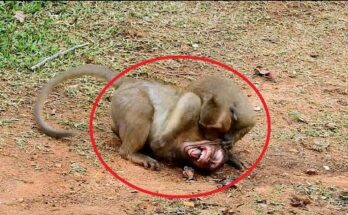The title “Milk… Milk… Desperate Baby Monkey’s Cry as Angry Mom Refuses to Nurse” immediately paints a heart-wrenching picture of a tender yet troubling moment in the life of a baby monkey and its mother. This story captures the raw emotions and primal instincts involved in the delicate relationship between a mother and her infant, especially when that bond faces stress or disruption.
In the wild, a baby monkey’s survival depends heavily on the nurturing care and nourishment from its mother. Milk is the primary source of sustenance during the early stages of life, providing essential nutrients for growth and immune protection. The sight of a baby monkey desperately crying out for milk is both natural and deeply moving—an instinctive plea for life and comfort. However, when the mother refuses to nurse, this natural process becomes a distressing ordeal, raising questions about the reasons behind her refusal and the baby’s fate.
The “angry mom” in this scenario likely reflects a moment of maternal frustration, fear, or discomfort. In some cases, a mother monkey might reject nursing due to stress, illness, or external disturbances in her environment. Sometimes, it may be a behavioral response caused by prior trauma or confusion, especially if the mother is inexperienced or overwhelmed. This refusal to nurse could also stem from environmental threats or social dynamics within the troop that disrupt normal bonding behaviors.
For the baby monkey, the inability to access milk can quickly become a life-threatening issue. Without the mother’s milk, the infant faces dehydration, malnutrition, and vulnerability to diseases. The baby’s cries echo its desperate need not just for food, but for comfort and reassurance from its mother. These cries often carry an urgent tone filled with pain, fear, and helplessness. The visual and auditory cues of a distressed baby monkey tug at the heartstrings of anyone witnessing the scene.
This scenario also shines a light on the challenges that wildlife face in their natural habitats—challenges that go beyond simple survival. The complex social structures, environmental pressures, and individual health all influence behaviors like nursing. Conservationists and animal behaviorists who observe such interactions understand the importance of maternal care for the survival of infant primates. When a mother rejects her baby, intervention may sometimes be necessary, especially in wildlife rehabilitation centers where caregivers may step in to feed and nurture the infant until it can survive independently.
Beyond the biological urgency, the story of the desperate baby monkey and the angry mother holds symbolic meaning about the fragile bonds of family and the emotional struggles of parenthood—even in the animal kingdom. It reminds us that maternal love, while often instinctive and unconditional, can be complex and influenced by a variety of factors.
This emotional and dramatic situation also raises awareness about the vulnerability of wildlife, encouraging empathy and respect for animals and their lives. It invites viewers or readers to reflect on the interconnectedness of nature, the importance of maternal care, and the challenges faced by animals in the wild.
In summary, “Milk… Milk… Desperate Baby Monkey’s Cry as Angry Mom Refuses to Nurse” is a poignant story of survival, maternal conflict, and the deep emotional cries of a baby monkey desperately seeking life-sustaining nourishment from its unwilling mother. It captures a moment of raw emotion, biological urgency, and the harsh realities faced by wildlife, making it a powerful narrative about nature’s beauty and cruelty intertwined.


